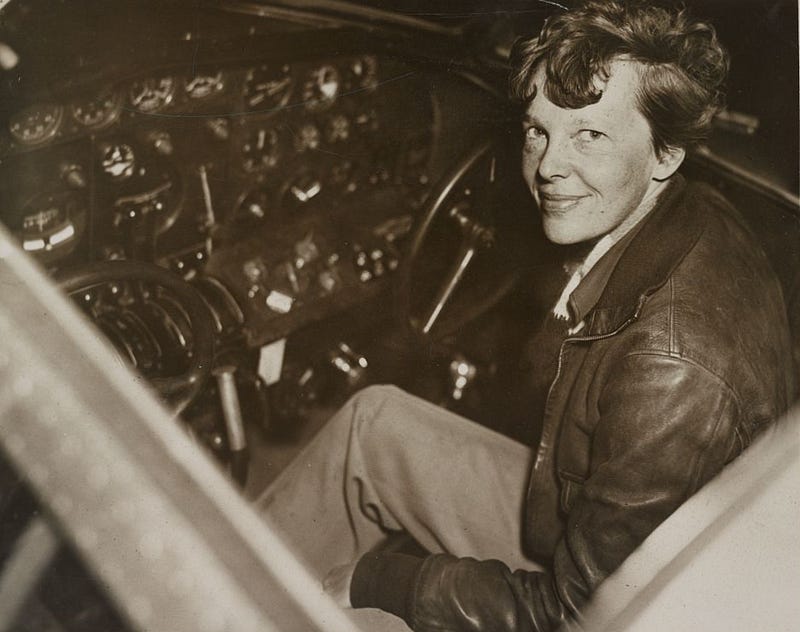
An essay on a different way to think about both hard work and failure.
A few nights ago, I read my 5 year-old daughter a book about Amelia Earhart, which featured the following quote:
I want to do it because I want to do it. Women must try to do things as men have tried. When they fail, their failure must be but a challenge to others.”
The first thing about this quote that jumped out to me, of course, was the brave and defiant attitude. Amelia Earhart was simply going to do what she set out to — chivalry and conventions be damned. Earhart was a big personality, and she gained the admiration of millions by doing something that other women didn’t dare do.
That’s the simple reading of her quote. But there’s something more at work here. It’s something that actually runs counter to Earhart’s big personality and the popularity she gained as a result of her bold moves. Particularly, that last sentence — about your failure being a challenge to others. That’s particularly interesting because it’s not a take on hard work and failure that I’ve heard before — or really, since.
Essentially, Earhart is laying out a formula for a really fulfilling way of life, and it has two components:
- Find something that you think must be done — whether by you, or just by anyone — it simply must be done. Live with the motivation to do all you can to help get that thing done. Have a solid mission.
- When you fail at that thing (which you will) — be willing to donate that failure. That is, let your failure be a challenge to others as well as your future self. Donate it for the good of the mission.
How often do we view the things we do as things that we must do — must try — even when, and especially when, failure is a likely outcome? Ask yourself. Look at your to-do list (if you have one), and see how many projects make you feel this way?
Look at your most recent failures — those times you gave it solid effort, but you fell short. How many of those did you view as a challenge to others? Much like me, you probably handled them by sulking, ruminating about it, and eventually just started working on something else. But you kept it to yourself.
Failure Shouldn’t Be About You
A lot of writers and speakers are talking lately about failure. Most of it has to do with what failure can do for you — how it can help you, how you can spin it, and so on. But failure doesn’t have to be about you at all. In fact, if you care enough about what it was you were trying to accomplish when you failed, it shouldn’t matter who does it, so long as it gets done. In that way, your failure should act as a genuine challenge to someone else — a challenge to pick up where you left off, and take that thing across the finish line where you couldn’t. And when they get further than you, you should be ecstatic!
In other words, if you care deeply enough about your mission, you don’t keep your failures to yourself — you donate them. You donate them to the cause, a sacrifice to the altar of the mission. You show your devotion to this thing you’ve chosen to pursue — because it’s not about you, it’s about getting the thing done. Your passion for this mission has transcended your ego.
How many of our failures do we view that way? Likely not many. But that’s not surprising. After all, it’s hard to do that. It’s hard to care so much about something that you don’t even care if you’re the one who gets it done, and you feel just as good when someone else does it as if you were to do it.
Find A Mission
That may sound like a lofty goal, but I think it’s one worth pursuing. When you have a goal like this, you do something really difficult to do: you lose your ego. You leave your ego behind because its importance pales in comparison to the importance of what you’re trying to accomplish.
When you do that — when you really leave your ego behind for the sake of the mission — you develop a kind of productive invincibility. You don’t wait for the mood to strike you to do work; you just work. You aren’t influenced by the winds of random feelings, fads, or trends. You just think of how to best do this damn thing, and get to work. You aren’t afraid to fail, because it’s not about you — it’s about the mission. And because you’re not afraid to fail, you try more, fail more, and learn more — and do so much more quickly.
The mission doesn’t have to be big. It can be small. It can be helping one person do something to advance their career. It can be cooking a healthy and tasty meal for your family. It can be beating a record on your morning run. When you care about the other person’s career, your family’s experience of a great meal, or running done well — and you take yourself out of the equation — it becomes easier to give your all.
The best pieces of writing I’ve done happen in this way. I forget that I’m trying to get my writing noticed. I drop my pride about whatever insight or piece of self-help I’m pushing out. Instead, I beam with excitement as I see writing that captures something, that inspires, and that serves.
And paradoxically, when it stops being about me or my involvement, that’s when I end up deriving the most benefit. The writing gets noticed, people thank me, I get other opportunities. Funny how that works.
